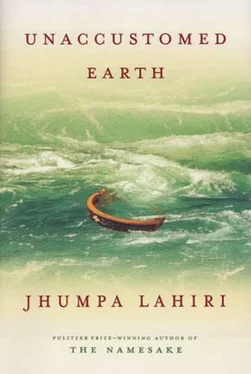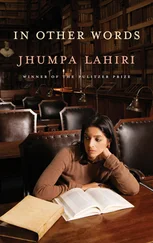I nodded, disturbed by the similarity of the name to mine, wondering if this had occurred to you.
"It makes me wish we weren't Hindu, so that my mother could be buried somewhere. But she's made us promise we'll scatter her ashes into the Atlantic."
I looked at you, confused, and so you continued, explaining that there was cancer in her breast, spreading through the rest of her body. That was why you had left India. It was not so much for treatment as it was to be left alone. In India people knew she was dying, and had you remained there, inevitably, friends and family would have gathered at her side in your beautiful seaside apartment, trying to shield her from something she could not escape. Your mother, not wanting to be suffocated by the attention, not wanting her parents to witness her decline, had asked your father to bring you all back to America. "She's been seeing a new doctor at Mass General. That's where my father often takes her when they say they're going to see houses. She's going to have surgery in the spring, but it's only to buy her a little more time. She doesn't want anyone here to know. Not until the end."
The information fell between us, as shocking as if you'd struck me in the face, and I began to cry. At first the tears fell silently, sliding over my nearly frozen face, but then I started sobbing, becoming ugly in front of you, my nose running in the cold, my eyes turning red. I stood there, my hands wedged up under my cheekbones to catch the tears, mortified that you were witnessing such a pathetic display. Though you had never taken a picture of me in your life, I was afraid that you would lift the camera and capture me that way. Of course, you did nothing, you said nothing; you had said enough. You remained where you were, looking down at the tombstone of Emma Simonds, and eventually, when I calmed down, you began to walk back to our yard. I followed you along the path you had discovered, and then we parted, neither of us a comfort to the other, you shoveling the driveway, I going inside for a hot shower, my red puffy face assumed by our mothers to be a consequence of the cold. Perhaps you believed that I was crying for you, or for your mother, but I was not. I was too young, that day, to feel sorrow or sympathy. I felt only the enormous fear of having a dying woman in our home. I remembered standing beside your mother, both of us topless in the fitting room where I tried on my first bra, disturbed that I had been in such close proximity to her disease. I was furious that you had told me, and that you had not told me, feeling at once burdened and betrayed, hating you all over again.
Two weeks later, you were gone. Your parents bought a house on the North Shore, which had been designed by a well-known Massachusetts architect. It had a perfectly flat roof and whole walls of glass. The upstairs rooms were arranged off an interior balcony, the ceiling in the living room soaring to twenty feet. There were no water views but there was a pool for your mother to swim in, just as she had wanted. Your first night there, my mother brought food over so that your mother would not have to cook, not realizing what a favor this was. We admired the house and the property, the echoing, empty rooms that would soon be filled with sickness and grief. There was a bedroom with a skylight; underneath it, your mother told us, she planned to position her bed. It was all to give her two years of pleasure. When my parents finally learned the news and went to the hospital where your mother was dying, I revealed nothing about what you'd told me. In that sense I remained loyal. Our parents were only acquaintances by then, having gone their separate ways after the weeks of forced intimacy. Your mother had promised to have us over in the summer to swim in the pool, but as her health declined, more quickly than the doctors had predicted, your parents shut down, still silent about her illness, seldom entertaining. For a time my mother and father continued to complain, feeling snubbed. "After all we did for them," they said before drifting off to sleep. But I was back in my own room by then, on the other side of the wall, in the bed where you had slept, no longer hearing them.
I did not attend my father's wedding. I did not even know there had been a wedding until my father called early one Sunday during my final year at Swarthmore. I was roused from sleep by a fist pounding on my door, followed by the voice of one of my hallmates saying my last name. I knew before answering that it was my father; there was no one else who would have called me before nine. My father had always been an early riser, believing that the hours between five and seven were the most profitable part of the day. He would use that time to read the newspaper and then go for a walk, along Marine Drive when we lived in Bombay and on the quiet roads of our town on the North Shore, and as much as he used to encourage my mother and me to join him I knew he preferred being alone. Things were different now, of course; those solitary hours he'd once savored had become a prison for him, a commonplace. I knew that he no longer bothered to go for walks and that since my mother's death he hardly slept at all. I had not spoken to my father in several weeks. He had been in Calcutta, visiting my grandparents, all four of whom were still alive, and when I picked up the phone, left for me hanging upside down by its cord, I expected him to say only that he had returned safely to Massachusetts, not that I now had a stepmother and two stepsisters.
"I must tell you something that will upset you," he began, and I wondered if perhaps one of my grandparents had fallen ill, if my mother's parents, in particular, could no longer endure the loss of their only daughter at the age of forty-two. It had been the hardest thing, in those first months after she was gone: having to go to Calcutta with my father and enter the home where my mother had been a girl, having to see the man and woman who had raised her, who had known her and loved her long before my father and I did. My grandparents had already lived in a state of mild mourning since 1962, when my parents were married. Occasionally my mother would return to them, first from Boston and then Bombay, like Persephone in the myth, temporarily filling up and brightening the rooms, scattering her creams and powders on the dressing table, sipping tea from cups she'd known since she was a girl, sleeping in the room where she'd been small. After we called my grandparents from Massachusetts to tell them my mother was dead, they had held on to the hope that it was only a matter of time, and that she would board a plane and walk through the door once again. Even after my father and I entered the house, my grandmother asked if my mother was still in the taxi that had already driven away, this in spite of the fact that a photograph of my mother, larger than life and draped with a tuberose garland, hung on their living-room wall. "She's not with us, Didun," I said, and it was only then both my grandparents broke down, grieving freshly for my mother as neither my father nor I had done. Being with her through her illness day after day had denied us that privilege.
But my grandparents were fine, my father reported now. They missed me and sent their love, he said, and then he told me about Chitra. She had lost her spouse two years ago, not to cancer but encephalitis. Chitra was a schoolteacher and, at thirty-five, nearly twenty years younger than my father. Her daughters were seven and ten. He offered these details as if responding diligently to questions I was not asking. "I don't ask you to care for her, even to like her," my father said. "You are a grown man, you have no need for her in your life as I do. I only ask, eventually, that you understand my decision." It was clear to me that he had prepared himself for my outrage-harsh words, accusations, the slamming down of the phone. But no turbulent emotion passed through me as he spoke, only a diluted version of the nauseating sensation that had taken hold the day in Bombay that I learned my mother was dying, a sensation that had dropped anchor in me and never fully left.
Читать дальше












